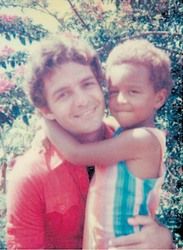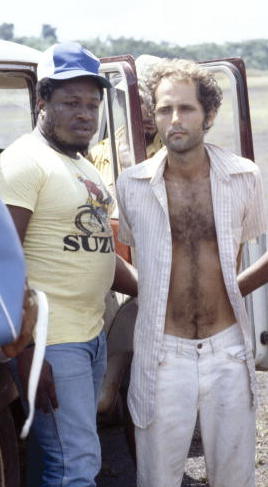I’m a lawyer. I’ve been a lawyer or a student of the law my entire adult life. Specifically, I’m a criminal defense lawyer. In my time I’ve been accused of being able to justify anything. I prefer to describe it as being able to see things from several perspectives. After all, our personal realities are defined by our own perspective. A spiritual person may view celibacy as a virtue, while an atheist may view it as a ridiculous restriction of one’s freedom. Although I am certainly in the former, I can understand and even debate the point of the latter. I always fancied myself to be clinical that way. Impartial. Detached.
Growing weary of the law, I finally followed the advice of several teachers I had as an adolescent and explored my creative side. I became a writer. A screenwriter, to be accurate. That doesn’t mean I stopped being a lawyer. I continue to fight the good fight for underprivileged people who find themselves in trouble. But my passion is certainly in my writing. I have now spent years writing several scripts that have garnered some attention and even landed me representation at a prestigious agency in Los Angeles. In fact, it was my agent who told me that I should either use my legal skills to write the next great legal drama or investigate a true story. Being that I cannot abide legal movies due to their rampant inaccuracies, I was left with true stories. But where to look?
Just prior to Thanksgiving of 2015, I met with a friend who worked at a production company that had produced several true stories. She was the one who pointed out that it had been nearly forty years since Jonestown, and nobody had produced a theatrical film about what really happened. At that time my understanding of Peoples Temple was no greater than most outsiders: A cult! Mass suicide! Poisoned Kool-Aid! A madman leader! They all went crazy, killed a congressman and then themselves!
“I can write this,” I said to myself.
I expected to enter nothing short of the heart of darkness. An exploration of pure evil. I found something else. Something unexpected— Stories of hope, camaraderie, community, acceptance, and even love. But, not a selfish sort of love. A love for all people of all creeds.
I tried to learn all I could about Peoples Temple by watching every available documentary and reading every book I could get my hands on. Still something felt elusive. I soon figured out that it was the people part of Peoples Temple. I then endeavored to find a story about the insiders of Peoples Temple, not a journalist’s story, or the story of someone who happened to be present on November 18, 1978, but a story about people who were brought up through the Temple and gave it all they had. So, I located the FBI file on Peoples Temple and mentally consumed it… All 287 parts, nearly 3,000 pages of it.
As I delved into the materials I had gathered, I noticed that many names came up repeatedly; Sharon Amos, Al Simon, Joe Wilson, Linda Arterberry, the Stoen family, the Cordell family and so on. However, two names stood out more than any others: Vernon Gosney and Laurence Layton.

 I found Vern and Larry to be fascinating in that they were geographically separated by a precious few miles, but economically worlds away. One was from a blue collar Richmond family while the other was the son of a prominent scientist for the Federal Government raised in Berkeley. No one could have ever guessed that their lives would one day intersect in such a heartbreaking fashion and to lead to an act of forgiveness that rivals any other tale that has been told.
I found Vern and Larry to be fascinating in that they were geographically separated by a precious few miles, but economically worlds away. One was from a blue collar Richmond family while the other was the son of a prominent scientist for the Federal Government raised in Berkeley. No one could have ever guessed that their lives would one day intersect in such a heartbreaking fashion and to lead to an act of forgiveness that rivals any other tale that has been told.
Redemption and forgiveness are both a stature and a gift. The difficulty in attaining redemption is only matched by the difficulty in granting forgiveness. The former rarely survives without the latter. That is why I chose to write a screenplay that focused on Vern and Larry, not because of what happened between them on November 18 and the Port Kaituma airstrip, but because Larry achieved a degree of redemption through Vern’s act of forgiveness. That was the tale worth a tell.
These are men who lost all they had, not only in their isolated jungle community, but throughout their journey in Peoples Temple: Larry, seeking to give back to the world and change it for the better, instead was stripped of his humanity; and Vern, seeking a home and community, and to be a better man and father, instead was misled by the shenanigans of a would-be despot. The nature of their tale is unique to the most, but relatable to and indicative of so many within Peoples Temple. This is why I chose to write this story. Not to glorify or vilify anyone. But to tell a little bit of everyone’s story.
It is my sincere hope that I was able to capture and communicate the spirit of the people of Peoples Temple. The well meaning nature of those involved, the idealism of those who were disenfranchised by the failures, and murders, of the heroes of the 1960s, to do justice for the memory of those no longer with us.
In the process of my eleven months of research and writing, I have learned that I am not the clinician I once fancied myself. I found myself caring a great deal for those I studied, people whose acquaintance I never made and have been dead for near forty years, and wishing I could do something to change their destinies.
In no way can I ever personally understand what it was like to live in Jonestown. But, in my own way, I feel a sort of kinship with these familiar strangers and that I am forever changed in how I perceive organizations such as Peoples Temple. Especially the people part.
(Benjello Jacob can be reached at bjacob3354@gmail.com.)